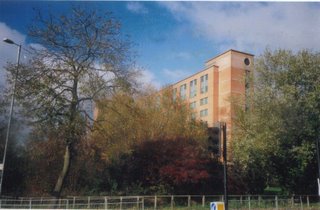Slave traffic to Iraq bases

"...rigorous code of business conduct"
KBR Tower, Greenford, Middx.
Bucking the Law, passing the buck, making the big bucks
CONTRACTORS working on US bases in Iraq are breaking US laws on human trafficking and forced labour. General George Casey, the top U.S. commander in Iraq has ordered that contractors be required by May 1 to return passports that have been illegally confiscated from workers on the bases.
Thousands of workers from poor countries in Asia and Central America have been brought in for tasks from labouring to security. In some cases people were hired then flown to Iraq without being told that was where they were heading. Some were taken from countries which had barred their nationals going to Iraq.
The Chicago Tribune, which has carried a series of reports investigating the traffic, said last week it had obtained two memos indicating that Casey's office concluded the practice of confiscating passports from such workers was both widespread on American bases and in violation of the U.S. trafficking laws.
"An order dated April 4 and titled 'Subject: Prevention of Trafficking in Persons in MNF-I," or Multinational Forces-Iraq, say the military also confirmed a host of other abuses during an inspection of contracting activities supporting the U.S. military in Iraq. They include deceptive hiring practices; excessive fees charged by overseas job brokers who lure workers into Iraq; substandard living conditions once laborers arrive; violations of Iraqi immigration laws; and a lack of mandatory"awareness training" on U.S. bases concerning human trafficking.
http://www.chicagotribune.com/news/nationworld/chi-nepal-specialpackage,0,7162366.special
Although other firms have contracts supporting the military in Iraq, the main company to which the US government has outsourced vital support operations is Halliburton subsidiary Kellogg Brown&Root (KBR) at a cost to the American taxpayer of more than $12 billion as of late last year. KBR, in turn, has engaged more than 200 sub-contractors, many of them based in countries which the United States has condemned for trafficking and human rights abuses.
KBR's sub-contractors employ people to dish out food, wash clothes, clean latrines and carry out virtually every other menial task.About 35,000 of the 48,000 people working under the privatization contract last year were "Third Country Nationals," who are non-Americans imported from outside Iraq, KBR has said.
A report by Tribune staff reporters Cam Simpson and Aamer Madhani published October 9, followed the journey of 12 men recruited from villages in Nepal. Most of them had contracts filed with their government falsely promising them positions at a five-star hotel in Amman, yet all 12 were sent into Iraq in August 2004. They were ultimately kidnapped from an unprotected caravan traveling along what was then one of the most dangerous roadways in the world: theAmman-to-Baghdad highway. All 12 men were killed.
Often families have been saddled with huge debts to pay fees demanded by brokers, promising good jobs. Even after discovering they'd been deceived, workers felt compelled to head into the war zone, or remain in danger for much longer than they desired, just to pay those debts. Subcontractors and brokers routinely seized workers' passports, deceived them about their safety or contract terms and, in at least one case, allegedly tried to force terrified men into Iraq under the threat of cutting off their food and water.
When Tribune reporters approached the Army, which oversees the KBR privatization deal, they were told "these are not Army issues." , Halliburton said in a written statement that questions regarding "the recruitment practices" of its subcontractors "should be directed to the subcontractor."
KBR now says it supports the US Defense Department probe into abuses. Previously company press releases claimed it "operates under a rigorous code of business conduct that outlines legal and ethical behaviors that all employees and subcontractors are expected to follow in every aspect of their work. We do not tolerate any exceptions to this Code at any level of our company". Maybe the company was looking the other way until the issue was forced on their attention.
Kellogg, Brown&Root is a major partner along with Carillion, Mowlem and HSBC in Aspire Defence Ltd., a consortium that has the biggest ever Private Finance Initiative deal, Project Allenby-Connaught, a 35-year reconstruction and servicing deal for army barracks in Aldershot and Salisbury Plain. A report in Private Eye (28 April) says the deal was only for £3.9bn when Aspire became the "preferred bidder" in 2003, but by the time the contract was signed this month it had risen to £8 bn. KBR and Carillion have also gained a £5.7bn job looking after the grounds and catering.
(for official MoD report:
http://www.mod.uk/DefenceInternet/AboutDefence/Organisation/
AgenciesOrganisations/AllenbyConnaught/)
KBR has been quietly involved in computer and IT services in the National Health Service, not previously its speciality.
http://www.bjhc.co.uk/journal/1/2003/5003.htm
Labels: Iraq

0 Comments:
Post a Comment
<< Home